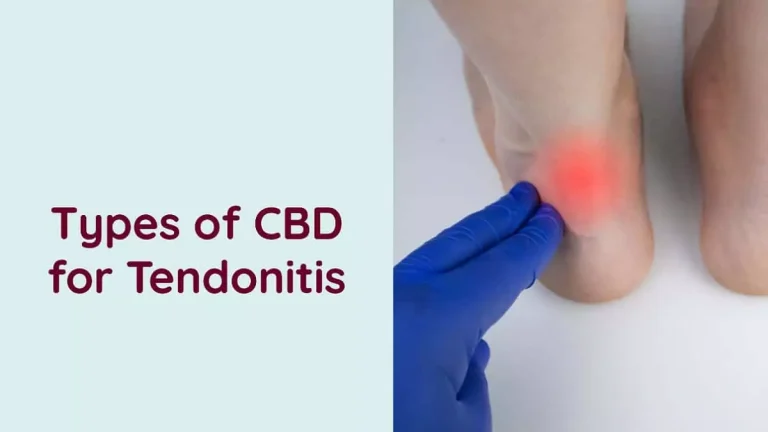CBD Dosage for Tendonitis: Tendonitis is a painful condition that affects the tendons, which are the tough, fibrous bands that connect muscles to bones. It is caused by overuse or injury to a tendon, and it can occur in any part of the body where there are tendons. Tendonitis can be a frustrating and debilitating condition, and it can be challenging to manage with traditional treatments. However, there is growing evidence to suggest that CBD may be an effective treatment for tendonitis. In this article, we will explore the best CBD dosage for tendonitis and how it can help alleviate pain and inflammation.
Table of Contents
Are you looking for a natural and effective way to manage your tendonitis pain? CBD may be the answer you’ve been searching for.
CBD, or cannabidiol, is a natural compound found in the cannabis plant. Unlike THC, the psychoactive component in cannabis, CBD is non-intoxicating and does not produce a “high.” CBD has been shown to have a range of therapeutic properties, including anti-inflammatory, analgesic, and anti-anxiety effects. Because of these properties, CBD has been gaining popularity as a treatment for a wide range of health conditions, including chronic pain, anxiety, and insomnia. And now, there is increasing evidence to suggest that CBD may also be an effective treatment for tendonitis.
Tendonitis can be a challenging condition to treat, and many traditional treatments, such as NSAIDs and corticosteroids, come with significant side effects. As a result, many people are turning to natural remedies, such as CBD, to manage their tendonitis pain. However, as with any medication, it is essential to get the right CBD dosage for tendonitis to ensure the best results.
What is Tendonitis?
Tendonitis is a condition that occurs when a tendon becomes inflamed or irritated. Tendons are the thick, fibrous bands that connect muscles to bones, and they are essential for movement and mobility. When a tendon is overused or injured, it can become inflamed, leading to pain, swelling, and stiffness.
Tendonitis can occur in any part of the body where there are tendons, but it is most commonly seen in the shoulders, elbows, wrists, knees, and ankles. Common causes of tendonitis include repetitive motions, such as those seen in sports or certain professions, as well as sudden injuries, such as falls or accidents.
How Does CBD Work for Tendonitis?
CBD has been shown to have a range of therapeutic properties that may make it an effective treatment for tendonitis. One of the main ways that CBD works is by interacting with the body’s endocannabinoid system (ECS).
The ECS is a complex network of receptors and neurotransmitters that regulate a wide range of bodily functions, including pain, inflammation, and immune function. CBD interacts with the ECS by binding to CB1 and CB2 receptors, which are found throughout the body.
When CBD binds to these receptors, it can help to modulate pain and inflammation, reducing the symptoms of tendonitis. CBD also has analgesic and anti-inflammatory effects, which can help to reduce pain and swelling in the affected area.
What is the Best CBD Dosage for Tendonitis?
When it comes to CBD dosage for tendonitis, there is no one-size-fits-all approach. The optimal dosage will depend on a range of factors, including the severity of the condition, the individual’s weight, and their tolerance to CBD.
It is important to start with a low CBD dosage and gradually increase it until you find the optimal dose for your needs. Most experts recommend starting with a dose of 5-10mg of CBD per day and gradually increasing the dosage by 5-10mg every week until you achieve the desired effects. It is important to note that CBD can take some time to take effect, so it is essential to be patient and consistent with your dosing.
CBD is available in a variety of forms, including CBD oils, CBD edibles, CBD capsules, and CBD topicals. The best form of CBD for tendonitis will depend on the location of the affected area and your personal preferences. For example, a CBD topical may be the best option for tendonitis in the wrist or ankle, while a CBD oil or capsule may be more suitable for more widespread tendonitis.
It is also essential to choose high-quality CBD products from reputable sources. Look for products that have been third-party tested to ensure their potency and purity.

CBD Dosage for Tendonitis: Conclusion
Tendonitis can be a frustrating and debilitating condition, but CBD may offer a natural and effective way to manage its symptoms. CBD works by interacting with the body’s endocannabinoid system to modulate pain and inflammation, and it has been shown to have analgesic and anti-inflammatory effects.
When it comes to CBD dosage for tendonitis, it is essential to start with a low dose and gradually increase it until you achieve the desired effects. It is also important to choose high-quality CBD products from reputable sources.
Overall, CBD may be a promising treatment option for tendonitis, and with the right dosage and product, it may help you find relief from this painful condition.




[…] from the cannabis plant. While it does not have the psychoactive effects associated with marijuana, CBD has been found to have numerous health benefits, including its potential to alleviate symptoms of […]
[…] occurs when the tendons that connect your muscles to your bones become inflamed or irritated. Tendonitis can affect any part of the body where tendons are present, but it most commonly affects the elbows, […]